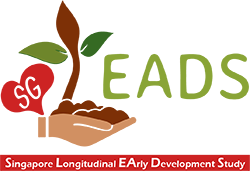MAJOR RESEARCH STUDIES
GUSTO: Growing Up in Singapore Towards healthy Outcomes

The GUSTO study is a major collaborative research effort involving partners across Singapore from healthcare and research alike. This includes the A*STAR Institute for Human Development and Potential (A*STAR IHDP), KK Women’s and Children’s Hospital (KKH), National University Health System (NUHS), and the National University of Singapore (NUS). The purpose of the GUSTO study is to understand how conditions in pregnancy and early childhood influence the subsequent health and development of women and children.
Over the course of 2009 and 2010, over 1,200 Singaporean women were enrolled in GUSTO, from a point in early pregnancy. Their infants were followed very closely as they grew, with over 10 observation visits in just the first 18 months of life alone. As the GUSTO children journey through life, we are there every step of the way. The detailed observations and sampling on these mothers and children have been instrumental in discovering features more representative of the local and Asian population that can be used to improve the health and potential of our communities, with an earlier start.
Find out more at GUSTO & S-PRESTO – Singapore Birth Cohort Studies.
S-PRESTO: Singapore PREconception Study of Long-Term Maternal and Child Outcomes

A collaborative effort by KKH, NUS, NUHS and A*STAR IHDP, the S-PRESTO study was launched in 2015 to investigate the effects of nutrition, lifestyle, mental health and other environmental factors before and during pregnancy on the eventual health and socio-emotional outcomes of the mother and baby.
Recruited before conception, 1,000 women between the ages of 18 to 35 years old who were planning to conceive were recruited prior to pregnancy and followed up through their pregnancy, until their child was two years of age. Through assessments such as imaging of the womb and ovaries, blood tests to determine ovarian health, as well as measurements of their body mass index and blood pressure, we’ve been able to establish the important mechanisms linking maternal and perinatal health and nutrition to child development while also using the data to assess fertility rates in Singaporean couples intending to conceive.
The long-term goal is to develop effective approaches to prevent metabolic diseases and neurodevelopment disorders – ultimately enhancing health outcomes for every birth.
Find out more at GUSTO & S-PRESTO – Singapore Birth Cohort Studies.
SG-LEADS: Singapore Longitudinal EArly Development Study

SG-LEADS is a major national study examining human development in Singapore to understand factors that can promote Singaporean children’s early childhood development.
Launched in 2017, the study has recruited 5,000 children below the age of 7 (and their caregivers) to date to learn about Singapore children’s early childhood development and better understand how environment influences children’s development.
The main research questions are on the state of Singaporean children – how family, childcare and early education institutions, community, and state interact to shape the development of Singapore’s children – and how these investments affect intergenerational mobility and social stratification in Singapore.
Currently conducting its third wave of research under A*STAR IHDP, SG-LEADS will be looking into child and maternal well-being with the goal of building human capacity in Singapore's population.
Through the use of innovative methods, the study is learning more about how children develop and factors that promote or impede healthy and holistic child development. By contributing to the knowledge pool on Singapore children’s early development, SG-LEADS aims to assist policy makers and practitioners address challenges for children in Singapore and help these young ones reach their full potential.
Find out more at SG-LEADS.
NiPPeR: Nutritional Intervention Preconception and during Pregnancy to maintain healthy glucosE levels and offspRing health

This randomised, controlled double-blind, multi-centre trial is academically led by the EpiGen Research consortium – comprising A*STAR IHDP, NUS, the University of Southampton, and the Liggins Institute at the University of Auckland – in collaboration with researchers at the Nestlé Research Center.
The preconceptual period is recognised as a time when the mother’s condition can profoundly affect subsequent development of her child. Improved nutrition before and during pregnancy has benefits for the health of the mother and her offspring, including healthy offspring body composition, decreased risks of childhood obesity, allergies and healthy neuropsychological development.
The NiPPeR study recruited 1,800 women before they conceived, across three centres in Southampton, Singapore and Auckland, and participants were divided into an intervention group and control group. Participants in the intervention group received nutritional drinks enriched with micronutrients, myo-inositol and a probiotic, while the control group received drinks enriched with standard micronutrients. This study examines the hypothesis that a nutritional drink, commencing before conception and through pregnancy, will assist in the maintenance of healthy glucose metabolism in the mother and promote offspring health.
Find out more at NiPPeR Study.
HEALTHSPAN
A*STAR IHDP, in collaboration with NUS Yong Loo Lin School of Medicine, has set up a Biology of Human Ageing Programme (Healthspan) to study human ageing in Singapore. The overall objective of the programme is to identify meaningful ways of improving health span in Singapore, through conducting observational studies and intervention studies involving lifestyle, nutritional and pharmaceutical interventions.
Restoring biological functions and preventing/reducing loss of autonomy and susceptibility to diseases are part of tackling the silver tsunami. Therefore, the programme will focus on age-associated deficits in physical frailty (e.g. sarcopenia, osteoporosis), cognitive frailty (e.g. cognitive decline, dementia), psychological frailty (e.g. depression), physiological frailty (e.g. immune, endocrine, cardiometabolic function), and even social/societal frailty (e.g. isolation). To identify meaningful ways to improve health span in Singapore, rigorous studies of lifestyle, nutritional and pharmaceutical interventions will run parallel to cohort studies.
Through the recruitment, phenotyping and biosampling of elderly cohorts, the SG90 Longevity Cohort Study launched in 2015 was an early effort under Healthspan to look at biological signatures of healthy ageing. At a later stage, there are plans to recruit the offspring of SG90 and age-match controls to study inherited factors, discover novel factors and validate biological patterns.
A*STAR celebrates International Women's Day

From groundbreaking discoveries to cutting-edge research, our researchers are empowering the next generation of female science, technology, engineering and mathematics (STEM) leaders.
Get inspired by our #WomeninSTEM
.png?sfvrsn=3d5fcb32_2)